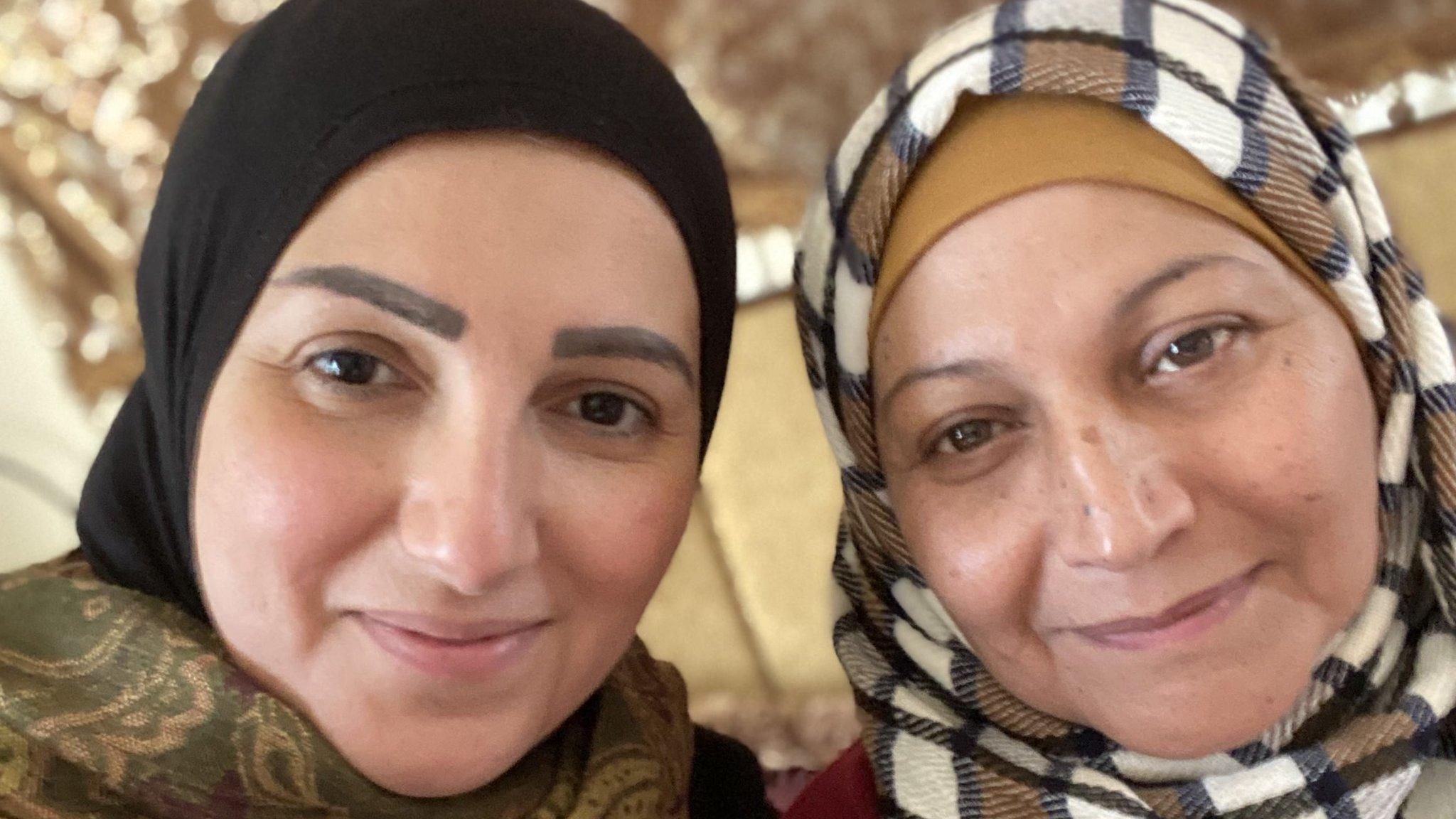Deep listening: Three women take a new approach to integrated schools
- Published

Tara Curran, Shannon Campbell and Lucy Millar joined people from more than 100 countries for the deep listening project
We hear views we disagree with all the time but do we really listen to them?
How do we approach difficult conversations in a way that ensures everyone feels fully heard?
Those are questions Tara Curran, Shannon Campbell and Lucy Millar have wrestled with over the past month.
They have been doing that while expressing their views on our school system in Northern Ireland.
Do we need more formally-integrated schools and what should the role of churches be in education here?
The three women have been taking part in the Crossing Divides around the Globe project, run by the British Council in partnership with the BBC.
All are in their 20s, all either work or volunteer in education, but would there be a meeting of minds between them?
The aim of the project is to train young people to listen and understand those with very different perspectives.
It hopes to encourage deep listening, which is to learn and practise skills of empathy, silence and suspending judgement.
To celebrate 100 years of the BBC, more than 1,000 young people in 100 countries took part in the project.
Parental choice
There is widespread agreement in Northern Ireland that we should try to educate more young people of all backgrounds together.
However there are differences of opinion about how best to do that.
Those differences were most recently aired in debates about a new law requiring the Department of Education (DE) to give more "support" to integrated education.
Tara, Shannon and Lucy presented their perspectives on our school system, and also deep listened to each other's views.
They found their differences of opinion were nuanced - on a spectrum but not at opposite ends of it.
Tara Curran is an engineer who went to an integrated post-primary. She now sits on the Board of Governors of an integrated school and is a trustee of the Integrated Alumni organisation.

The aim of deep listening is to learn and practise skills of empathy, silence and suspending judgement
She does not think all schools in Northern Ireland should be formally integrated but wants more of them.
"There should be more integrated schools so there is parental choice and we are matching the demand and the needs for parents and pupils out there," she said.
"At the minute we only have 7% of students going to integrated schools and a massive 93% that still lie within segregated sectors.
"Although I would like to see it grow I don't think that banishing every other type of school is necessarily the way to go because, again, parental choice."
'Naturally integrated'
Shannon Campbell went to an integrated primary and then a Catholic Maintained post-primary and now works in the Catholic chaplaincy at Queen's University.
"There were children of all faiths and none in my Catholic school," she said.
"Northern Ireland is so diverse and there's a place at the table for a variety of types of school."
Lucy Millar, who is just about to embark on a career as a teacher, has a similar view but wants churches to get more involved with their local schools.
"The controlled sector is quite integrated but naturally integrated," she said.
"I don't think all schools should be formally integrated but I feel that integration, naturally, is really important within schools."
So their differences on our school system were on the scope and pace of change - rather than any radical disagreement - and there was some common ground.
Listening to learn
All of the three women spent time at explaining their position to each other at length, but also connecting and listening to others across the world debate different subjects.
It is not often that we listen to someone else without interjecting or questioning, but that is one of the keys of deep listening - so what did they learn in the process?
"It is very hard not to interject or when someone else is speaking to lead the conversation in a different direction," Lucy admitted.
"But I think when we sat down we were practising that deep listening and allowing each other time to think and actually reflect on what we were saying.
"You're not listening for things that you have to defend, you're actually listening for things that you learn."
Shannon said she found the approach "really refreshing".
"It sort of taught me that maybe I don't listen very well in everyday life.
"You're listening to people and because you know you're not allowed to interject you really listen to them.
"You're not thinking about what you're going to say next or what you're going to say back to the person or 'how could I disagree with that and get my opinion across?'
"You are literally just listening, taking in what they have said."
'Just trying to connect'
Tara, meanwhile, thought the deep listening approach helped understanding.
"If you feel valid and listened to, you're more likely to share more, you're more likely to be able to connect with that other person," she concluded.
"A lot of the time we're just trying to connect and if we feel that disconnect or dismissed straight away, that's where really difficult or controversial conversations go astray.
"Isn't it great that we have so many different points of view? I think that's amazing."
Crossing Divides around the Globe is one of a number of initiatives to mark 100 years of the BBC.
The British Broadcasting Company began radio broadcasts from London in November 1922.
The first broadcast from Belfast followed two years later in 1924.
Related topics
- Published14 March 2022

- Published4 March 2020
